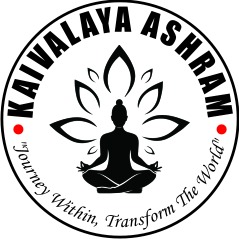“उद्धरेदात्मनाऽऽत्मानं नात्मानमवसादयेत्।”
Uddhared ātmanātmānaṁ nātmānam avasādayet — Bhagavad Gītā 6.5
“Let one uplift oneself by one’s own Self; let not the Self be degraded.”
Kaivalaya Ashram is a member of the Association for Spiritual Integrity (ASI). As such, we have committed to honoring a code of ethics as outlined by the ASI, to ensure that our own organization, along with our guest teachers, faculty, and facilitators, hold ourselves to the highest standards of ethics, integrity, and professional competency. With a vested interest in facilitating the most nurturing and safe experience possible for all of our guests, it is essential that we promote the work of teachers and leaders who are willing to abide by the same ethical standards while visiting and working on our premises. Our motto of service is “SEVA,” which is voluntary in nature, and we, by principle, do not and shall not charge any fees, donations, consultancy fees, session charges, webinar charges, or money in any form. Please help us to ensure an environment of honesty, integrity, compassion, humility, and empathy for everyone. Visit the ASI’s website at spiritual-integrity.org/org-ethics to review the honor code to which you are committing by signing this contract..
Declaration
Code of Honor
Kaivalaya Ashram — Membership with the Association for Spiritual Integrity (ASI)
Honor Code of Ethics and Good Practice for Organizations
As leaders and officials of a spiritual organization, we commit to:
1. Holding ourselves, our colleagues, and our staff to the highest standards of ethics, right behavior, and professional competency, as commonly recognized by our peers.
2. Performing our organizational and public-facing roles in a caring and compassionate manner in both one-on-one and group interactions.
3. Respecting the rights, dignity, and safety of all who belong to our organization and those whom we serve.
4. Fostering autonomy, empowerment, self-sufficiency, and emotional maturity within our organization and in our dealings with others.
5. Treating questions, concerns, doubts, and experiences raised within our organization and from those we serve, with respect, and never trivializing or dismissing enquiries.
6. Being self-aware, open, and humble about the limitations of our knowledge and experience.
7. Making only honest, realistic statements regarding the benefits of our organization’s offerings.
8. Refraining from giving counsel in matters outside of our areas of training and expertise, and making appropriate referrals as needed.
9. Being honest and transparent regarding business and financial matters relevant to our students, clients, donors, and other stakeholders.
10. Honoring the sanctity of privacy and maintaining the confidentiality of information conveyed to our organization and its representatives in confidence.
11. Abiding by local laws with respect to the disclosure of information in cases of sexual abuse, child endangerment, and the intention to harm oneself or others.
12. Using proper care and caution with techniques that can potentially cause harmful side effects.
13. Acknowledging that, regardless of our spiritual attainment, we and our representatives are human beings with human personalities, limitations, drives, and needs.
14. Not seeking or presuming exalted privileges or glorified status because of our role in the organization.
15. Never manipulating, exploiting, or deceiving another member of the organization or those we serve to satisfy our personal aspirations, needs, or desires.
16. Establishing and maintaining clear and wholesome professional boundaries within the organization and with those we serve.
17. Never abusing the trust of members of the organization or those we serve by exploiting them with unfair, coercive, or deceptive attempts to obtain money or free labor. (This does not include reasonable fees for services, donations of money and time, or volunteer work freely offered.)
18. Being particularly mindful of sexual boundaries within the organization and with those we serve—and honoring them at all times.
19. Cultivating and practicing honesty, integrity, compassion, humility, and empathy.
20. Engaging in continuous self-reflection, learning, and holistic personal growth.
21. Regularly reviewing our motivations and monitoring the integrity of our words and actions both within the organization and with those we serve.
22. Encouraging feedback about our own methods and behavior—and taking that feedback seriously. This includes complaints submitted to the ASI.
23. Addressing promptly any personal issues, concerns, or challenges that might affect our professional competency or our organization’s mission.
24. Placing highest priority on the organization’s legal obligations and ethical commitments to all our stakeholders.
With Love & Light
Master. Supratim Chowdhury




The Eight Commandments of Seva — Kaivalaya Ashram
“The Eight Commandments of Seva” as lived and taught in Kaivalaya Ashram — where service (Seva) is not merely an act, but a pathway to liberation, inner awakening, and universal consciousness.
This version integrates your philosophy of collective consciousness, the witness (Sākṣī), and the unity of Ātman–Brahman, expressed through the lived practice of selfless action and inner surrender.
1. Seva is the Living Path of Awakening.
True Seva is not a duty but a sacred sādhanā — a means through which consciousness purifies itself by serving its own reflection in others. Every act performed in awareness becomes an offering to the Divine within all beings.
“When the heart is purified by selfless service, wisdom dawns naturally.” — Bhagavad Gītā 5:7
2. Seva Dissolves Karma and Expands Consciousness.
Each selfless action performed without desire or attachment releases the knots of karma that bind the soul to illusion. Through serving others, one serves oneself — for the giver, receiver, and act are all waves of the same ocean of consciousness.
“By selfless action alone man attains the highest perfection.” — Bhagavad Gītā 3:19
3. Seva is the Gateway to Satsangha.
In Satsangha — the company of truth and seekers — Seva becomes collective worship. Through shared service and sacred togetherness, the individual mind dissolves into the rhythm of a unified awareness. This collective consciousness becomes a living temple of Truth.
“Where two or three gather in the name of Truth, there the Divine abides.”
4. Seva Leads to the Realisation of the One Witness (Sākṣī).
The essence of Seva is awareness — the remembrance that the doer, the deed, and the one served are all seen by the same eternal witness within. The Sākṣī consciousness remains untouched by action, yet all actions flow through it.
“He who sees action in inaction, and inaction in action, is truly wise.” — Bhagavad Gītā 4:18
5. Seva Awakens the Realisation of the Self as Brahman.
Through serving without ‘I’ or ‘mine,’ one awakens to the truth that the same divine presence dwells in all. The act of Seva thus becomes a meditation in motion — dissolving the veil of separation between the server and the served.
“Ātman is Brahman — the Self within is the Infinite beyond.” — Mandukya Upaniṣad
6. Seva is the Highest Offering to Humanity.
To help another awaken is the noblest form of worship. True Seva uplifts consciousness — guiding others toward inner stillness, clarity, and self-realisation. Each compassionate act becomes a sacred flame lighting the path for another soul.
“He who lights the lamp of others shall himself be illumined.” — Chandogya Upaniṣad
7. Seva is Voluntary, Unconditional, and Non-Transactional.
The essence of Kaivalaya Ashram’s service is pure Seva — voluntary, self-offered, and free from all exchange. By principle, the ashram does not and shall not charge any fees, donations, or monetary compensation in any form. All actions are dedicated to the upliftment of consciousness, offered as love without expectation.
8. Seva is the Culmination of Spiritual Life — Union with the One Consciousness.
When Seva ripens into surrender, the individual self dissolves into the ocean of divine awareness — Brahman. What remains is pure witnessing, silent compassion, and the bliss of unity with all that is.
“When all actions are offered to the One, freedom is attained here and now.” — Bhagavad Gītā 3:30
